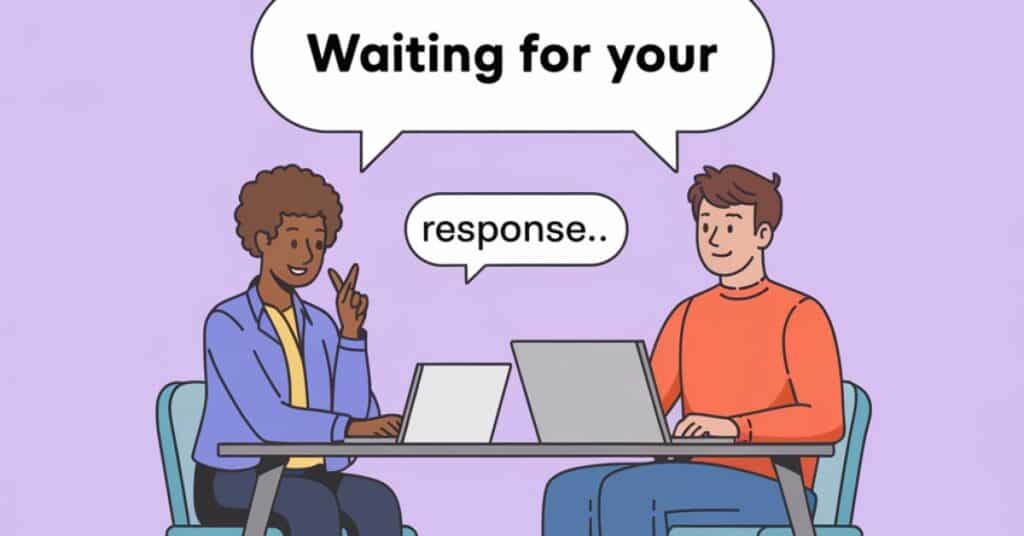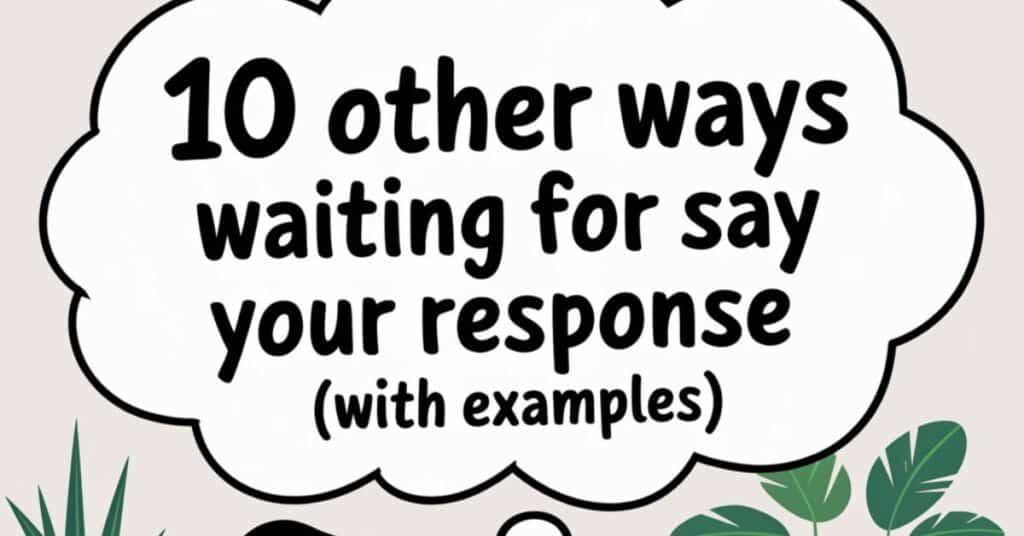In our fast-paced world, effective communication is key. Whether you’re sending a professional email, a text message, or a casual note, finding the right words is essential. Here’s a concise introduction focused solely on your main keyword: “waiting for your response” often feels repetitive and can diminish the impact of your communication.
To keep your interactions fresh and engaging, it’s helpful to explore alternative expressions. By varying your language, you can convey eagerness, urgency, or respect for the recipient’s time.
In this article, we’ll explore ten effective alternatives to “waiting for your response,” complete with examples to enhance your communication skills and foster more engaging conversations.
What to Say Instead of “Waiting for Your Response”

- Looking Forward to Your Reply
- Eagerly Awaiting Your Feedback
- Anticipating Your Response
- Hope to Hear From You Soon
- Awaiting Your Thoughts
- Your Prompt Response Would Be Appreciated
- Please Let Me Know Your Thoughts
- I Would Appreciate Your Input
- Looking for Your Insights
- Hoping for Your Response Soon
Looking Forward to Your Reply
This phrase conveys enthusiasm and anticipation for the recipient’s response.
- Example: “Thank you for your input! I’m looking forward to your reply.”
Eagerly Awaiting Your Feedback
This variation emphasizes your eagerness for their thoughts or feedback.
- Example: “I’ve sent you the draft; I’m eagerly awaiting your feedback.”
Anticipating Your Response
This is a straightforward way to express that you expect a reply soon.
- Example: “I appreciate your help on this matter. Anticipating your response.”
Hope to Hear From You Soon

A friendly and casual alternative that indicates you expect a reply.
- Example: “Thanks for considering my proposal. Hope to hear from you soon!”
Awaiting Your Thoughts
This phrase suggests you are interested in their opinion or input.
- Example: “I’ve shared the report; awaiting your thoughts on it.”
Your Prompt Response Would Be Appreciated
This phrase politely requests a timely reply.
- Example: “I hope you can provide your insights soon; your prompt response would be appreciated.”
Please Let Me Know Your Thoughts
This is a direct and clear way to request feedback.
- Example: “I’ve outlined the plan. Please let me know your thoughts.”
I Would Appreciate Your Input
This expresses gratitude in advance for their response.
- Example: “I value your expertise in this area. I would appreciate your input.”
Looking for Your Insights
This phrase highlights that you are seeking their knowledge or perspective.
- Example: “I’m compiling the final report and looking for your insights.”
Hoping for Your Response Soon
A warm way to indicate that you’re waiting for their reply.
- Example: “I know you’re busy, but I’m hoping for your response soon.”
Related Phrases for Different Contexts
Checking In for Updates
Use this when you want to follow up on an ongoing conversation or project.
- Example: “Just checking in for updates on the project timeline.”
ALSO READ THIS ARTICLE ;10 Better Ways to Say ‘I Hope You Are Doing Well’ in Emails
Awaiting Your Confirmation
This is suitable when you need approval or confirmation on something.
- Example: “I’ve sent the details for your review; awaiting your confirmation.”
Let Me Know When You Can Respond
A casual way to let someone know you’re waiting for their reply without putting pressure on them.
- Example: “I understand you’re busy—just let me know when you can respond!”
Frequently Asked Questions
What is a more formal way to say “waiting for your response”?
A more formal way to say “waiting for your response” is “I await your prompt reply.” This phrase is suitable for business or professional correspondence.
How can I follow up without sounding pushy?
You can follow up by saying, “I hope this message finds you well. I just wanted to check in regarding my previous email.” This approach is polite and shows consideration for the recipient’s time.
Is it appropriate to use casual language in professional emails?
While casual language can be acceptable in some professional contexts, it’s essential to know your audience. If you’re unsure, it’s better to err on the side of formality.
What can I say if I haven’t received a reply in a while?
You could say, “I wanted to follow up on my previous message as I haven’t heard back yet. Your input is important to me.” This is a gentle reminder without being overly demanding.
How do I encourage a quicker response?
To encourage a quicker response, you can use phrases like “Your prompt attention to this matter would be greatly appreciated” or set a specific deadline for feedback.
Conclusion
Finding the right words to convey your message is essential to maintaining effective communication. Instead of the overused phrase “waiting for your response,” using alternatives can enhance your writing and make your communication more engaging. Whether you choose to express eagerness, politeness, or anticipation, the right phrase can convey your intent while respecting the recipient’s time.
By incorporating these alternatives, you can foster clearer and more positive interactions, ultimately strengthening your professional and personal relationships. Choose the phrase that best fits the context, and watch how it can transform your communication style!

“Robert Henry is an experienced blogger with a passion for language and education. His insightful posts on Vocab Scope offer readers valuable tips on vocabulary and grammar. With a background in linguistics and a knack for clear, engaging writing, Robert is dedicated to helping others enhance their communication skills.”






